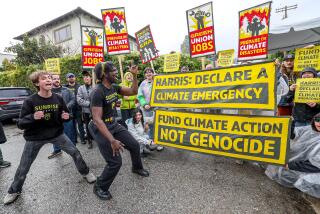S. Africa Police Drive Blacks From Beaches : Tutu in Anti-Apartheid Protest Broken Up With Gas, Whips, Helicopters
- Share via
JOHANNESBURG, South Africa — Police used rubber whips, tear gas and low-flying helicopters to disperse black picnickers at whites-only beaches near Cape Town on Saturday and broke up other anti-apartheid protests nationwide in the most concerted effort yet to quash a new campaign of civil disobedience.
About 60 people were arrested in Cape Town, Johannesburg and Durban in protests related to the Mass Democratic Movement’s two-week-old “defiance campaign,” designed to press for an end to segregated hospitals, schools, beaches and neighborhoods.
Dozens of protesters were bitten by dogs or whipped, and, in a separate incident at a township near Cape Town, a black policeman was killed by a gang of youths.
Thousands of blacks, mixed-race Coloreds and whites heeded the Mass Democratic Movement’s call on a sunny, warm winter’s day, and headed for The Strand and Bloubergstrand, the only two segregated beaches near Cape Town.
Police Cordon Off Beach
But the police had cordoned off a 2.5-mile stretch of The Strand, a favorite of conservative white Afrikaners, and over the “whites only” signs placed placards reading: “Danger no entry, South Africa Police dog training.” Roadblocks manned by heavily armed officers turned busloads of protesters away.
Anglican Archbishop Desmond M. Tutu was carried on the shoulders of demonstrators onto the sand southeast of Cape Town and strolled there briefly before he and about 400 people were dispersed by police.
Then Tutu went to Bloubergstrand, or Blue Mountain Beach, northwest of Cape Town, where 1,500 demonstrators were being driven away by police using whips. Yellow police helicopters hovered low over the protesters, blowing sand and sending them fleeing.
Black Sash, an anti-apartheid organization of white women, said in a statement that its members “watched in horror” as officers charged families eating picnic lunches and building sandcastles.
Guarding ‘Beach Apartheid’
“It is incredible that the government is prepared to use arms on people who wish to have a picnic,” said Tutu, the 1984 Nobel Peace Prize winner. “Instead of getting rid of beach apartheid, they protect it with policemen, dogs and guns.”
Tutu persuaded demonstrators to leave the beaches after the confrontations, saying they had made their point.
“We have proved these are God’s beaches,” he said.
The National Party-led government, facing one of its most important parliamentary elections in history on Sept. 6, has kept a low profile throughout much of the defiance campaign, which began Aug. 2 when dozens of blacks sought medical care at whites-only hospitals.
Right-Wing Criticism
But, under increasing criticism from its right-wing white political opponents, the government has in recent days vowed to take whatever steps are necessary to maintain public order.
“Lawlessness and anarchy will not be tolerated,” Gen. H.G. (Hennie) de Witt, commissioner of police, declared Friday, only hours after the arrest of Mohammed Valli Moosa. Valli Moosa, general secretary of the restricted United Democratic Front (UDF) anti-apartheid coalition, has been one of the leaders of the defiance campaign.
In Johannesburg on Saturday, a singing, chanting crowd of 300 gathered downtown to protest Valli Moosa’s arrest. Police ordered the group to disperse and then charged them with whips and batons. Nine activists were arrested.
Authorities banned a major rally called for today in Johannesburg to declare that the two dozen restricted opposition groups, such as the UDF, were back in business. Under the three-year-old emergency decree, police may ban virtually any gathering and indefinitely detain activists without charge.
More to Read
Sign up for Essential California
The most important California stories and recommendations in your inbox every morning.
You may occasionally receive promotional content from the Los Angeles Times.














